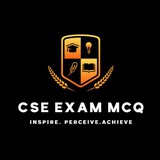The Union Cabinet is responsible for :
Anonymous Quiz
54%
Lok Sabha
5%
Rajya Sabha
40%
Parliament
1%
Businessman
Consider the following statements regarding the National Commission of Women :
1. It is a constitutional body
2. It was created after the LPG reforms made in India
3. It can make recommendations while any such act passed in parliament related to women
1. It is a constitutional body
2. It was created after the LPG reforms made in India
3. It can make recommendations while any such act passed in parliament related to women
Which of the statements given above is/are correct?
Anonymous Quiz
13%
1 and 2
10%
2 only
46%
2 and 3
31%
3 only
Gurupadswamy Committee is related to which of the following?
Anonymous Quiz
10%
Banking Reforms
34%
Prevention of Child Labour
42%
Reservation for Women in Lok Sabha.
13%
Conservation of Western Ghats
Which article of the Indian Constitution deals with the powers, privileges, and immunities of State Legislatures and their members?
Anonymous Quiz
17%
191
33%
192
30%
193
20%
194
Constitutional Status of Goa
Anonymous Quiz
17%
49th constitutional amendment act
35%
56th constitutional amendment act
34%
67th constitutional amendment act
13%
79th constitutional amendment act
Who among the following was elected as president of constituent assembly of India?
Anonymous Quiz
11%
Jawaharlal Nehru
11%
Sachindra Sanyal
7%
Sardar Vallabhbhai Patel
71%
Rajendra Prasad Dr.
Consider the following statements regarding the election of Deputy Chairperson of Rajyasabha:
1. He/she is elected by the Rajya Sabha itself
2. A candidate has to secure a Simple Majority i.e. majority of the members present and vote in order to get elected as the Deputy Chairman of Rajya Sabha
3. The election process presided over by the Chairman of Rajya Sabha
1. He/she is elected by the Rajya Sabha itself
2. A candidate has to secure a Simple Majority i.e. majority of the members present and vote in order to get elected as the Deputy Chairman of Rajya Sabha
3. The election process presided over by the Chairman of Rajya Sabha
Consider the following statements:
1. RTI abbreviated as Right to Intelligence
2. The judges excluded from RTI
1. RTI abbreviated as Right to Intelligence
2. The judges excluded from RTI
Which of the statements given above is/are correct?
Anonymous Quiz
8%
1 only
34%
2 only
17%
Both 1 and 2
40%
Neither 1 nor 2
Which of the following are bills ?
1. Ordinary bill
2. Amendment bill
3. Forwarding bill
4. Consolidating bill
5. Continuance bill
1. Ordinary bill
2. Amendment bill
3. Forwarding bill
4. Consolidating bill
5. Continuance bill
Select the correct answer using code given below:
Anonymous Quiz
44%
1 , 2 and 4 only
25%
1 , 2 and 5 only
3%
3 , 4 and 5
28%
1 , 2 , 4 and 5
Which of the following are motions introduced in parliament?
1. Subsidiary motion
2. Substantive motion
3. Substitute motion
4. Subside motion
1. Subsidiary motion
2. Substantive motion
3. Substitute motion
4. Subside motion
Select the correct answer using code given below:
Anonymous Quiz
17%
1 and 2 only
48%
1 , 2 and 3 only
8%
3 and 4 only
27%
1 , 2 , 3 and 4
The ‘Watch and Ward Committee’ is related to
Anonymous Quiz
25%
Parliament Privileges
29%
Parliament Quorum
34%
Parliament Security
12%
Parliament Sessions
Which of the following bodies is NOT recognised as ‘Public Authorities’ under the RTI Act?
Anonymous Quiz
18%
Election Commission
54%
Board of Control for Cricket in India (BCCI)
14%
Securities Exchange Board of India (SEBI)
14%
Unique Identification Authority of India (UIDAI)
Under which of the following Jurisdiction, the Supreme Court can hear cases only when they are appealed against a High Court order?
Anonymous Quiz
8%
Advisory jurisdiction
71%
Appellate jurisdiction
12%
Original jurisdiction
9%
Constitutional jurisdiction
Which of the following articles of the constitution embody the “Principles of Natural Justice”?
1. Article 14
2. Article 21 3. Article 22 Which of the above is/are correct?
1. Article 14
2. Article 21 3. Article 22 Which of the above is/are correct?
Anonymous Quiz
14%
1 only
16%
2 and 3 only
30%
1 and 2 only
40%
1, 2 and 3
The Patents Act, which governs patent law in India, was passed in :
Anonymous Quiz
15%
1967
29%
1970
40%
1972
16%
1988
